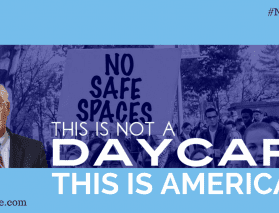I like Andy Stanley. His writing and teaching have been a help to me over the years. But his recent attack on families and churches leaves me wondering if he hasn’t drunk too much of his own mega-church Kool-aid.
I’ve enjoyed Stanley’s leadership sessions at Catalyst and elsewhere. Although we’ve never met, we have a number of mutual friends. He is the pastor of the largest church in America.
But his recent slam on any church that isn’t trying to be a mega-church and any family that isn’t trying to join one leaves me speechless and longing for the rise of a truly resurgent Church.
Watch for yourself (transcript below):
https://www.youtube.com/watch?v=gZhhpiU4d0ATranscript: “The Church for me has provided some of my lifelong friendships. And you know what’s fabulous? The church has done the same things for my kids. My kids’ best friends right now, my kids’ best friends are people that they met at church – and at school– but mostly at church. And the kids that they went to school and church with, they are their dear friends all the way through high school and college. And for many of your kids this is true as well.
For me, some of my closest adult friends I’ve met, not in rows, but in circles. We say circles are better than rows because in circles you have actual community and it’s been in community and community groups that Sandra and I have met lifelong friends. That would not have happened for me, that would not have happened for us as a couple apart from the local church.
Now, this is one reason we build big churches. People say ‘Why do you have to make ‘em so big.’ Let me tell you why we make them so big. You probably didn’t know this. It’s kind of an insider secret. We want churches to be large enough so that there are enough middle schoolers and high schoolers that we don’t have one youth group with middle school and high school together. We want there to be so many adults that there will be so many middle school and high school kids that we can have two separate environments.
So when I hear adults say ‘Well I don’t like a big church. I like about 200. I want to be able to know everybody.’ I say you are so stinking selfish. You care nothing about the next generation. You care nothing about you and your five kids. You don’t care about your kids, anybody else’s kids. And you say, what’s up? I’m saying, if you don’t go to a church large enough where you can have enough middle schoolers and high schoolers to separate them so that they can have small groups and grow up the local church you are a selfish adult.
Get over it. Find yourself a big ol’ church where your kids can connect with a bunch of people and grow up and love the local church. Instead, what you do–can you tell I’m passionate about this–Here’s what you do. I’m so sick of this. I hear this all the time. ‘Well I just don’t like a big church.’ So here’s what you do. You drag your kids to a church they hate and then they grow up to hate the local church and then they go off to college. And you know what you pray for? You pray that there will be a church in their college town that they will connect with. And guess what, all those churches are big. The kind of church you don’t like. So let me move on.
Parents: Don’t attend a church that teaches your children to hate church. Don’t attend a church that teaches your children to hate church.”
I sort of get where he’s coming from here in the first part. Sort of. At least I’m trying really hard to get it.
Like him, I’ve seen a lot of kids leave the Church once they get older. And I agree about the need for authentic relationships born of faith-focused community. But then he goes off the rails.
Stanley has been open about how he came to dislike church because of his father’s all-consuming focus on ministry. I have long suspected that those scars have governed most of Stanley’s approach to ministry and, in the process, have influenced countless pastors and churches across America.
But his own all-consuming focus on his own brand of ministry is now leading him to attack families, pastors, and churches who don’t share his views.
His statements imply that pastors of churches who are not trying to become a mega church like his are also selfish and off-course. It’s as if he’s the mega-store trying to drive out the little guy to drive up his own sales. The irony is that the very pastors criticized by his remarks are the ones who pay to hear him speak at conferences.
And his anti-family message to parents? If you attend a church of 200 people (the typical church in the United States) your children will hate church. I’ve got news for you, there are lot of Christian young people who’ve grown up in mega churches who hate the church, too. (Including yourself, Andy.)
How did the Church of Jesus Christ survive before mega-churches came along? Did we simply have a whole lot of selfish Christians who refused to come together to form one large church so their kids could have separate middle school and high-school ministries?
I’ve been involved in ministry to middle school and high school kids for many years. I’ve been in the trenches with them every day when I ran a Christians school. I worked with hundreds of pastors and youth leaders and thousands of families dealing with real life issues. And I could not disagree more with the notion that having robust and separate ministries for them is the key to a thriving faith. In fact, it is total nonsense. Some of the most destructive environments for the faith of Christian young people are youth groups at church.
Most of these kids are with no one but their own peer group all week in school. My own children have experienced these groups at large churches only to find that they were not all that welcome since they were not already part of the school cliches already in place. They could show up every Sunday for weeks at a time without one person so much as speaking to them, noticing them, or following up with them. And the biblical instruction was so shallow that they were embarrassed to speak up for fear of being labeled a know-it-all. (And they do not know it all.)
But shallow theology seems to suit many mega-churches just fine. Shallow theology is what is killing the church in America today, not the lack of middle school ministry. Erick and I address this in You Will Be Made to Care:
Meanwhile, others, especially pastors at many of the mega-churches in Protestant circles, chose to stop talking about any issues that might be deemed offensive to a secular culture. Instead, they set out to convince unbelievers that the new generation of Christian was a kinder, gentler believer. And so seeker-friendly churches were born in the hope that a winsome voice that didn’t mention sin would draw everyone to Jesus. The strategy did draw large crowds; however, the seeker-friendly Jesus didn’t have much to say to them. Because this strategy put butts in the pews, many churches in America followed their lead, hoping to be the next big thing in ecclesiastical circles. In doing so, pastors traded truth for Twitter followers, television appearances, bestseller lists, and speaking gigs at conferences—and now we’re all paying for it.
One consequence of the seeker-friendly approach is that we have a lot of people in the pews who are only there for the show. And those who do believe often have little to no understanding of their faith and its implications on all of life. We’ve done a great job of attracting the hungry, but we’ve denied them access to the miraculous loaves and fishes that will put meat on their spiritual bones. Compared to previous generations, most Christians today have no grasp of the basic doctrines of the faith, the content of Scripture, or the history of the Church. That fact is especially ironic given our unprecedented access to study tools for spiritual growth with the rise of the Internet. Consequently, today’s believers are especially vulnerable to the secular Gospel of Societal Evolution. Even pastors who know the truth don’t preach it, because they think their congregation can’t handle it. But if that is true, it’s more a poor reflection on the pastor than on the people entrusted to his care.
Shepherds are supposed to guide the flock where they need to go to ensure they are fed. Instead, what we have today is a hungry church with a wimpy faith because pastors don’t teach them the whole counsel of God. Pastors tell their followers that they need Jesus, but not enough preach on what should happen after they’ve found Him.
Why would I bow to Stanley’s bullying (essentially calling me a hater if I don’t go to a mega-church) and send my children to a church led by a pastor who refuses to take a stand for something so basic as marriage being ordained by God as between one man and one woman? At a Christian conference last year, Stanley said this:
“There is not consensus in this room when it comes to same-sex attraction. There is not consensus in this room when it comes to gay marriage,” said Stanley. “We just can’t continue to look into the filter of our politics at our spirituality. Its got to be the other way around … and specifically when it comes to this issue.”
So affirming marriage to be what God says it to be is letting our politics guide our spirituality? I have a hard time not seeing that statement as an over-reaction to his own father’s political involvement back in the day. I hope so. Otherwise, he has fallen into the same trap as so many other pastors in America today–the mistaken belief that once a moral issue is discussed by politicians, it is off-limits for pastors.
What good is it to have a church with 33,000 people attending if you don’t tell them the truth? Another selection from Chapter 8 of the book entitled “Pastors, Priests, and Powerless Pulpits”:
For far too long, pastors have been asleep at the wheel, allowing our culture to drift into secularism without raising the alarm from the pulpit.
At the founding of our country, ministers and clergy were the fiercest defenders of freedom because they recognized the true source of all freedom and the evil inherent in tyranny of all sorts. Sermons on issues affecting public life were commonplace. In the decades leading up to the American War for Independence, sermons laid the cultural groundwork to justify the need for action. Issues such as the repeal of the Stamp Act, overreach in government power, science, current events, astronomical discoveries, the death penalty, and changes in marriage laws were commonplace topics for sermons. Ministers were among the first to call for resistance to the king’s tyranny and even among the first to pick up a musket to defend those freedoms granted by God to us all. But not anymore.
Instead we get sermons on “Five Tips for Achieving a Fulfilling Life” and books about how to make every day a Friday—while a cultural wildfire burns around us. Sermons that apply Scripture and transhistorical truth to the cultural issues of the day are rare, and deemed out of bounds by many Christians. I’m sure few readers can recall the last time their pastor, or any pastor, attempted to explain the cultural shifts that have rocked our society over the last half century. And I’ll bet you’ve never heard a sermon on the vital importance of religion to public virtue and thus to the preservation of our freedoms in America.
Pastors have remained silent as morality has collapsed.
As to Andy Stanley’s rabid commitment to splitting up the family into narrowly-defined youth groups (he says the main reason they want big churches is to do just that), the church does not need to further rip apart the family in order to thrive. Quite the opposite. Both the church and family must be made stronger together. That’s why in You Will Be Made to Care we call for authentic community in the form of families connecting with other families of like faith so children will see that their parents are not the freaks the Left claims them to be.
We certainly don’t need Andy Stanley joining in the attacks against Christian parents because they won’t follow his own brand of ministry, an approach that has produced impressive numbers but little impact on our culture.
The body of Christ was never intended to be divided so narrowly by artificial constructs like school grades or even age groups. We’ve bought into this compartmentalization of the church thanks to the industrial revolution and an outdated assembly line way of thinking. But it is NOT the organic, community-oriented model we see in Scripture.
“Let the little children come” and hang out with us adults. Let them see authentic community taking place. Let them learn alongside us as we teach them in word and deed. Let them see our faith interwoven throughout all of our lives rather than having the perspective of a narrow slice of their generation forced upon them. Sure, they can and should do stuff together with other kids their age (my own children are on a youth retreat as I write these words), but to call parents selfish for not choosing a church committed to splitting up their family is a bridge too far.
Not only is it not biblical, it is part of the anti-family problem.
Someone close to Andy Stanley needs to pull him aside and confront him for his unbiblical position.
And pastors and parents who hear his message should ignore it as the nonsense that it is.
What your children think about church will be determined largely by whether or not they see authentic faith lived out in your own life–not by the size of a mega-church youth group.
UPDATE: Andy Stanley apologizes:
The negative reaction to the clip from last weekend’s message is entirely justified. Heck, even I was offended by what I said! I apologize.
— AndyStanley (@AndyStanley) March 4, 2016












